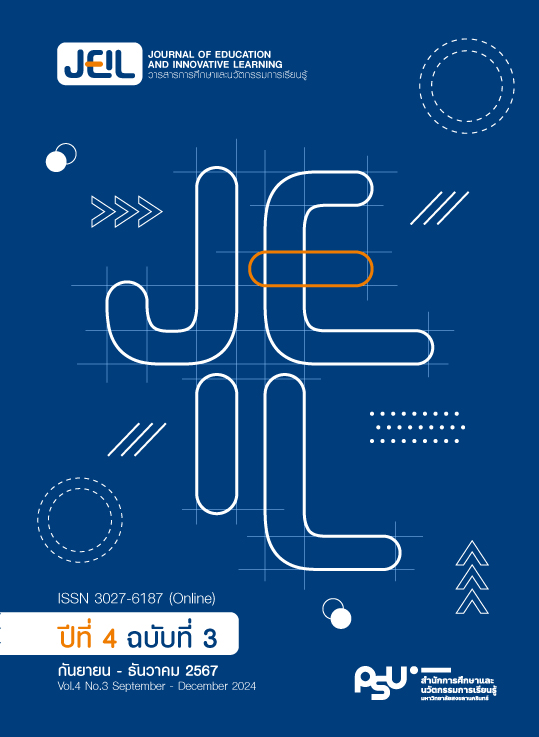The Effect of Project-based Learning on Applying Wisdom for Health Promotion Competencies in Nursing Students
Main Article Content
Abstract
This research was a quasi-experimental study using the one-group pre-post test design. The research aimed to compare nursing students' knowledge before and after studying the topic of applying wisdom to health promotion in project-based learning management, to study the effect of project-based learning in applying wisdom to nursing students' health promotion, and to study nursing students' satisfaction with project-based learning. The sample was 105 second-year students from the nursing faculty at Ubon Ratchathani University. The research tools included a learning plan in the health promotion course on applying wisdom to students' health promotion. The tools for data collection included 1) the quiz on applying wisdom to students' health promotion with KR-20=0.70, 2) the competencies test in applying wisdom to students' health promotion with Cronbach's reliability coefficient alpha at 0.959, and 3) the satisfaction evaluation of project-based learning with Cronbach's reliability coefficient alpha at 0.954. The research used descriptive statistical analysis and the paired sample t-test. The results showed that after learning the topic of applying wisdom to students' health promotion, the mean score in the post-test for second-year students from the faculty of nursing at Ubon Ratchathani University increased statistically significantly at P<0.01. The results of project-based learning management on competency in applying wisdom to health promotion were at the most strongly agree level. Satisfaction with project-based learning was at the highest level.
Article Details

This work is licensed under a Creative Commons Attribution-NonCommercial-NoDerivatives 4.0 International License.
The contents and data in published articles in the Journal of Education and Innovative Learning are considered the ideas and responsibility of the author(s). The Editorial team does not necessarily agree with any ideas or hold mutual responsibility of them. Plagiarism is not permitted, even for academic purposes. However, proper citation must be given whenever referencing the articles.
References
Best, W. J., & Kahn, V. J. (1993). Research in education (7th ed.). Boston: Allyn and Bacon
Donkram, I., Budseeta, P., & Prasoptham, J. (2022). The Integrated teaching of 3 subjects to marketing students of KPRU using the project based approach with a project obtained from the Faculty's missions of academic service, research, and cultural preservation. The Golden Teak: Humanity and Social Science Journal, 28(3), 66-80. Retrieved from https://so05.tci-thaijo.org/index.php/tgt/article/view/251092 [in Thai]
Guo, P., Saab, N., Post, S. L., & Admiraal, W. (2020). A review of project-based learning in higher education: Student outcomes and measures. International Journal of Educational Research, 102, 101586. doi:10.1016/j.ijer.2020.101586
Hatari, L., Marsono, & Yoto. (2022). The effect of the project-based learning model on the soft skill of vocational school students. Technium Social Science Journal, 24, 180-193
Klahan, P., & Ponegrn, W. (2021). Development learning activities based on a design thinking process and project based learning to enhance innovators in grade 10 students development learning activities based on a design thinking process and project based learning to enhance innovators in grade 10 students. Journal of Education Studies, 49(2), 1-16. doi:10.14456/educu.2021.34 [in Thai]
Koonkaew, A. (2017). Statistics for research. Bangkok: Chulalongkorn University Printing House [in Thai]
Loyens, S. M. M., Van Meerten, J. E., Schaap, L., & Wijnia, L. (2023). Situating higher-order, critical, and critical-analytic thinking in problem- and project-based learning environments: a systematic review. Educational Psychology Review, 35(2), 39. doi:10.1007/s10648-023-09757-x
Nuiplot, N. (2021). Developing students systematic thinking and problem solving skills using project-based learning in science subject of general education courses. Journal of Education and Innovative Learning, 1(1), 45-59. Retrieved from https://so06.tci-thaijo.org/index.php/jeil/article/view/248023 [in Thai]
Office of the Basic Education Commission. (2021). Project-based learning: PBL. Bangkok: N.A. Rattana trading limited partnership. [in Thai]
Parra-Anguita, L, López-Franco, M. D., Martínez-Galiano, J. M., González-Cabrera, M., Moreno-Cámara, S., & Granero-Moya, N. (2023). evaluation of the use of project-based learning in the nursing degree. Nursing Reports, 13(4), 1648-1657. doi:10.3390/nursrep13040136
Pitiporntapin, S., Boonsoong, B., & Yokyong, S. (2021). Development of undergraduate student’s scientific drawing competency and satisfaction towards project-based learning in biology drawing course. Journal of Education Naresuan University, 23(4), 354-368. Retrieved from https://so06.tci-thaijo.org/index.php/edujournal_nu/article/view/247999 [in Thai]
Sarayuthpitak, J. (2023). Health education learning management in the 21st century. Bangkok: Chulalongkorn University Printing House [in Thai]
Simswat, G. (2022). Community-based learning in 21st century among the outbreak of coronavirus disease 2019 (COVID-19). Srilangchang Research Journal, 2(6), 47-55. Retrieved from https://ojs.mbuslc.ac.th/index.php/srj/article/view/151 [in Thai]
Thongaime, A. (2018). Project based learning for developing student in the 21st Century. Valaya Alongkorn Review Journal, 8(3), 185-199. Retrieved from https://so06.tci-thaijo.org/index.php/var/article/view/163191 [in Thai]
Thonghaew, S., & Chaijaroen, K. (2020). Enhancing/promoting the 21st century learning skills of Chinese major students: project-based learning (PBL). Journal of Modern Learning Development, 5(5), 1-12. Retrieved from https://so06.tci-thaijo.org/index.php/jomld/article/view/243829 [in Thai]


